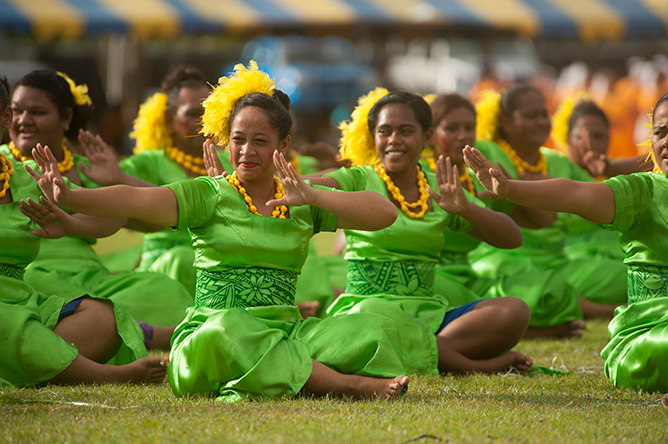
Often times a single person’s journey can be the catalyst for great change. This has been the case throughout history and will continue to be the case into the future.
For the United Nations Development Programme (UNDP) office in Samoa, only one representative will be making the journey to COP21 this December.
But this journey, while small in numbers, is carrying a message of key importance. Filia Iosefa is this person, this envoy. Iosefa, UN Coordination Specialist, travelled to Paris - together with other four delegates of the Pacific Indigenous Network - with one goal, to make a difference to the lives of Pacific peoples. It is not often that one is honored with the opportunity to travel to such a meeting and to be the envoy of such an important goal.
Iosefa has been tasked with bringing the voice of the people of the Pacific to Paris, to demand positive and legally binding results that will ensure the livelihoods of the Pacific peoples. “I would like to see the Pacific voices be heard in Paris, and making a strong statement to protect our land and our heritage. We have to fight for our survival and our most valuable possession, which is our land.”
More specifically Iosefa will be lobbying for the Pacific Indigenous Peoples Declaration to be included in the final Paris outcome statement. He will also be working closely with the Small Grants Programme (SGP) to launch the joint outcome statement from the Caribbean and Pacific South-South Youth Initiative. These two aspects are of key importance to the conference and also the Pacific moving forwards. As Iosefa highlights: “Youth are the future leaders of tomorrow, they play a vital role in shaping our future economic growth and saving our environment, our land, our culture, our heritage.” This relates directly to the second aspect that Iosefa will be lobbying for and that is the voice of the Indigenous Peoples of the Pacific through the Declaration.
This declaration recognises the serious implications of climate change on indigenous cultures, while also highlighting that the Pacific Island states, and countries have contributed the least to dangerous emissions but they face some of the most serious consequences from the effects of these emissions on our environment. The Declaration highlights that there is a strong need to “Promote existing indigenous Pacific community mechanisms to continuously enhance national, regional and global results-based mitigations action.”
Iosefa adds to this that: “I would like to see a legally binding outcome statement from the COP21 conference in Paris to lower carbon emissions so that the world’s temperatures doesn’t rise above 1.5 degrees or catastrophe of the worst kind will hit our planet earth. This is why our island leaders have been pushing for 1.5 degrees. Most of the negotiators from larger nations have so far ignored our plea. We need to have our voices heard in Paris and be recognised by the bigger developed nations. They must join us in our efforts to save our environment.”
Saving our environment, saving our homes and our lands is what this conference must achieve. It cannot be achieved by singular countries alone it must be a global push by all countries to take these issues seriously and to put in place mechanisms and mitigations strategies that will ensure our futures.
As Iosefa points to strongly: “Climate change is real, but so too are the resilience of our people. We must fight for our island homes.” This sentiment is strongly conveyed by the youth involved in the Caribbean and Pacific South-South Youth Initiative. In their joint statement it was highlighted that “Pacific people are not drowning. We are fighting.”
With these powerful statements in support, Iosefa’s journey becomes of increasing consequence. He may be the only one undertaking this journey from Samoa, but at the same time he is carrying with him the voices, goals and ambitions of many. He has the full support of those voices and his journey is thus not merely one person’s mission, but one person’s ability to carry out the work and lobbying for those who will lead the Pacific countries into the future. His role at the conference is of undoubted importance for the people that he is representing. We cannot let the issue of climate change drag on any further. We must find the moral strength within us to support positive action at this conference and also into the future to ensure that the outcomes are followed through on
